
Winter Sports
14:00, 18-Apr-2019
Soaring ambition in winter sports: How China taps into Finland's astonishing success
Hu Zhicheng
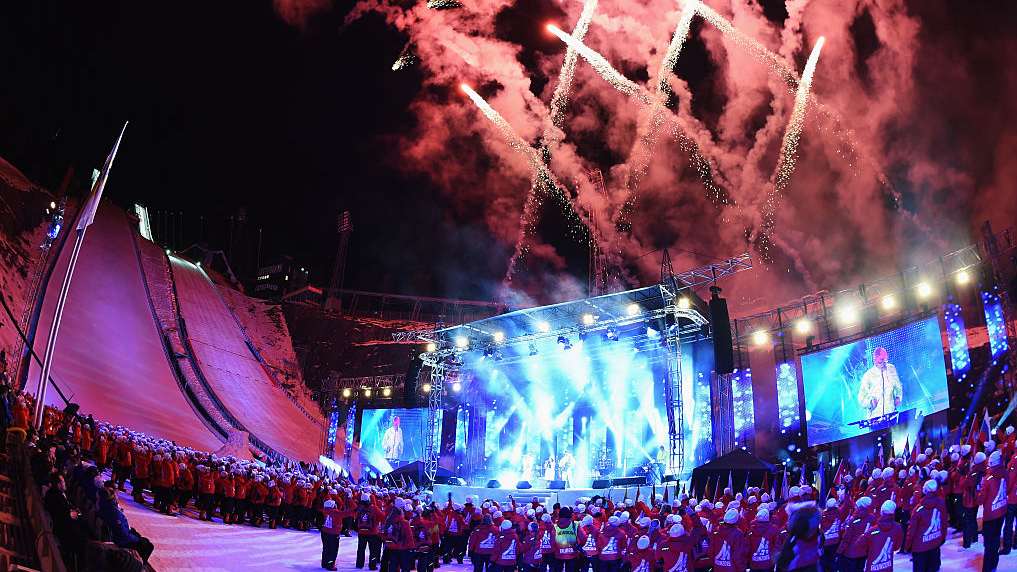
No one batted an eyelid on a frigid Friday afternoon in April when thousands of men, women, and children, all bright-eyed and bushy-tailed, queued up outside the Helsinki Ice Hall for the 2019 World Synchronized Skating Championships.
It would take an exceedingly brave soul in any other country to shrug off the shiver of sub-zero temperatures just in an attempt to catch sight of a low-profiled and almost negligible event, which involves a non-Olympic sport and struggles to gain serious traction among notoriously hard-to-please ordinary fans.
However, this is Finland and the Finns are anything but ordinary.
Nobody here really seems particularly disturbed by the howling winds or the fact that the tournament is not voguish enough. As expected, tickets for the championships sold out within an hour.
Despite its aversion to blowing its own trumpet, Finland has been named the happiest nation in the world by a UN report for the second straight year and ranks among the top in global competitiveness – not bad going for a far-off land close to the Arctic with a population the size of the Pudong district of Shanghai.
As bizarre as it sounds, prolonged and severe winters have barely made a dent in the Finns' insouciant flair, which brings into sharp relief their strong social safety net, free education, minimal bureaucracy and, crucially, soft spots for engaging in a variety of sports.
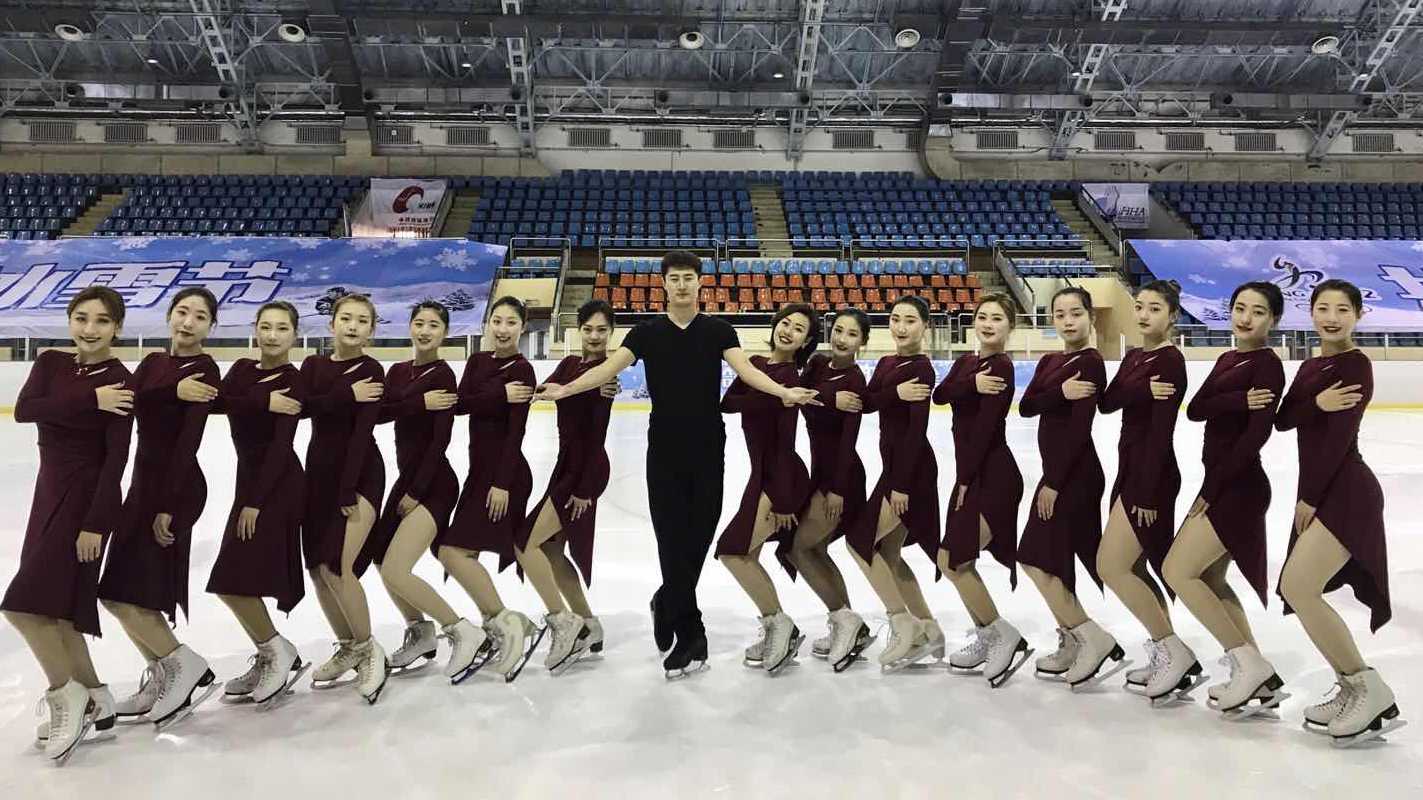
Sparkling Chinese skaters of the Team Ice Pearls pose for a group photo. /CGTN Photo
Sparkling Chinese skaters of the Team Ice Pearls pose for a group photo. /CGTN Photo
Coming-out party
"Our obsession with winter sports is extraordinary," beamed Nina Jakonen, secretary-general of the Finnish Sportswriters Association as we zigzagged through the ebullient crowd, food outlets and cavernous hallways before reaching the press box of the indoor arena.
Unlike in most countries, where winter sports are principally spectator sports, in Finland, practically all of its 5.5 million inhabitants are actually participating in them, be it ice skating, sledding or snowboarding.
"It's not an exaggeration to say that we are born with skis on our feet," Jakonen continued.
Perched high above ice level with a terrific vantage point, we were blessed to witness history up close as China made its long-awaited debut at this synchronized skating tournament. With Scorpions' "Maybe I Maybe You" blaring in the background, 16 sparkling skaters from Team Ice Pearls of China wowed the audience with their thrilling agility and unbridled vibrancy.
Though strictly speaking it was not an electrifying, crowd-on-its-feet kind of performance – that accolade would inevitably belong to Finland's Team Marigold Ice Unity and Russia's Team Paradise – Team China deserves a round of applause for making a giant stride in such a short period of time. And, unbeknownst to many, Finland is arguably the chief contributor in this respect.
"Our synchronized skating team was just built from scratch last June," China captain Zhao Yue told CGTN. "Before that, we have gotten some really intensive training going on with coaches in Helsinki and there was a steep learning curve."
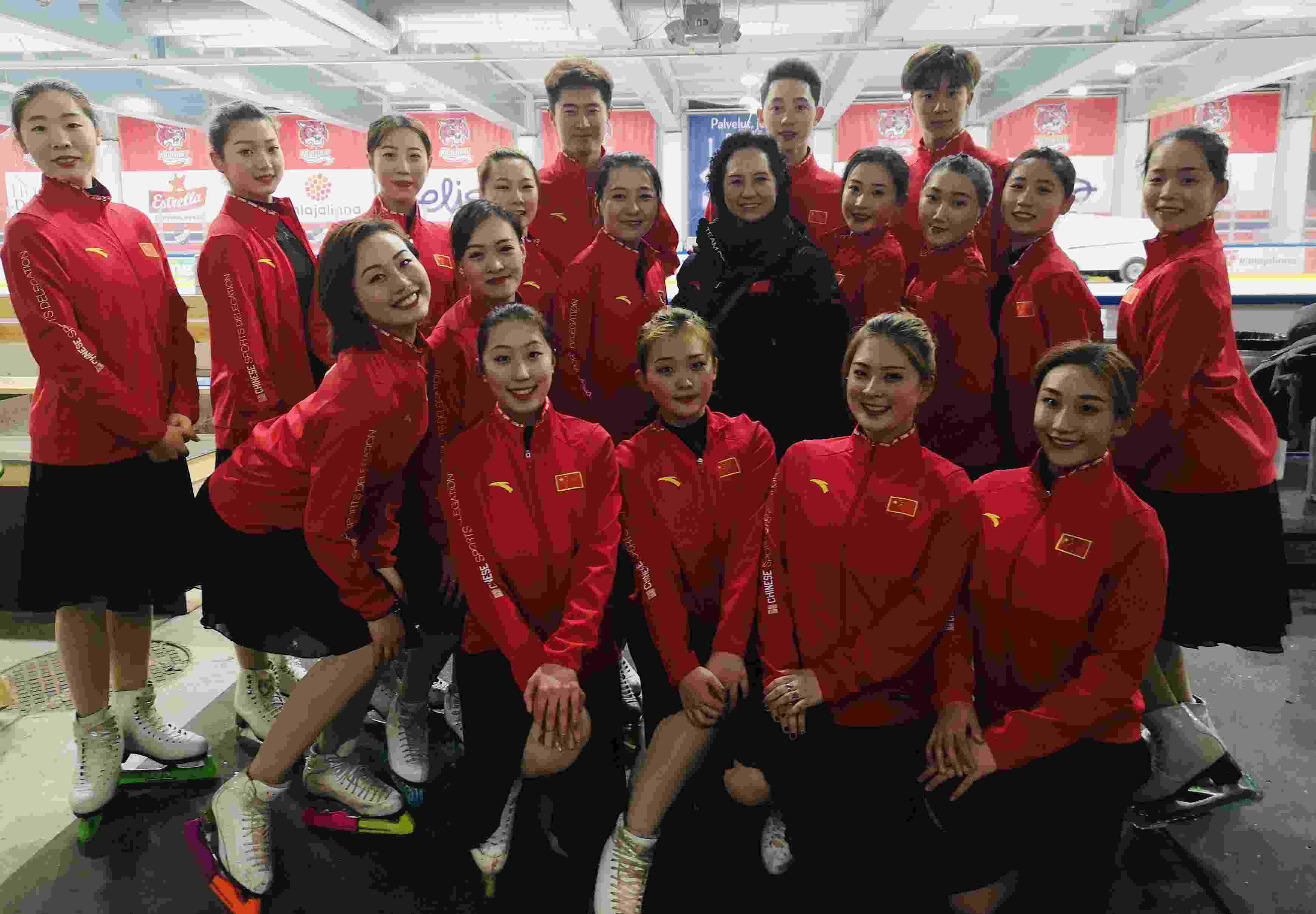
China captain Zhao Yue (L3) has a great smile that radiates wherever she is. /CGTN Photo
China captain Zhao Yue (L3) has a great smile that radiates wherever she is. /CGTN Photo
With a history of over 100 years in winter sports, Finland has the most Olympics medals per million population, taking home over 140 gold medals along the way. The masters from the Nordic country have every reason to be patronizing and haughty, but the humility and patience they displayed throughout the training have blown Zhao away.
"Finnish coaches are absolutely brilliant. They are incredibly humble and willing to listen. We improved a lot under their meticulous coaching. I really couldn't have asked for more."
There were a contrasting bashfulness and innocence backstage in conversation with this otherwise charismatic captain who led her team out on Friday to skate on foreign soil. But Zhao's voice strengthened when the Harbin-born girl let drop her burning desire to make further progress in the long run.
"I still have a lot of room for improvement and every skater wants to learn from the best. Hopefully, our team will have the opportunity to train in Finland again."
No worries on that front. Zhao will, in all probability, have her wish granted sooner than later by dint of a grand plan.
01:40
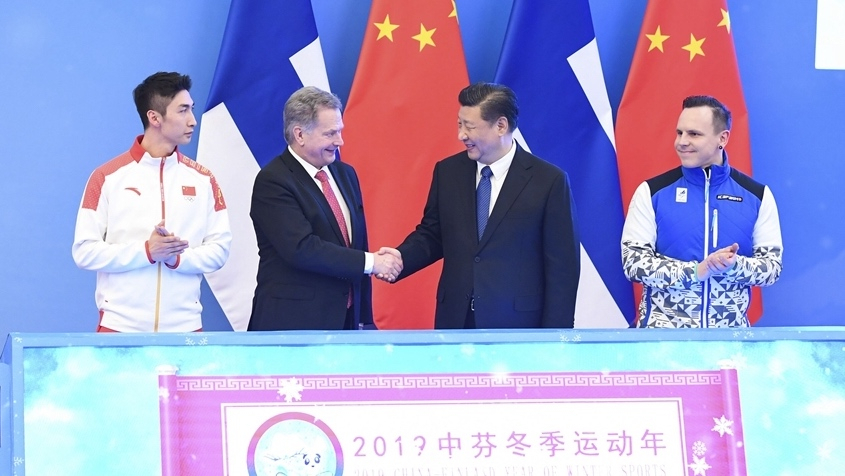
Frantic boom
In January this year, Chinese President Xi Jinping hosted his Finnish counterpart Sauli Niinisto in Beijing for the official launch of China-Finland Year of Winter Sports 2019, setting in motion a whole stack of joint projects – chief among them are the training of elite coaches and athletes, exchange of know-how in organizing sports events, and devotion to building a strong sporting culture.
This one-of-a-kind cooperation in winter sports reflects China's growing intimacy with the small yet ever-reliant Finland but this closeness between the two nations is not a recent phenomenon. The first Olympics China ever competed was exactly the 1952 Helsinki Games.
"Our common work in the field of winter sports rests on a solid foundation, and has the support of the very highest level," opined Kati Malkki-Karttunen, coordinator of the China-Finland Year of Winter Sports program at the Finnish Ministry of Education and Culture.
"Finland is the first country to agree on this type of thematic year on winter sports with China and we highly appreciate that China chose Finland," she told CGTN. "I'm convinced that this partnership will serve as an important stepping-stone towards a successful Beijing Olympic and Paralympic Games in 2022."
00:43
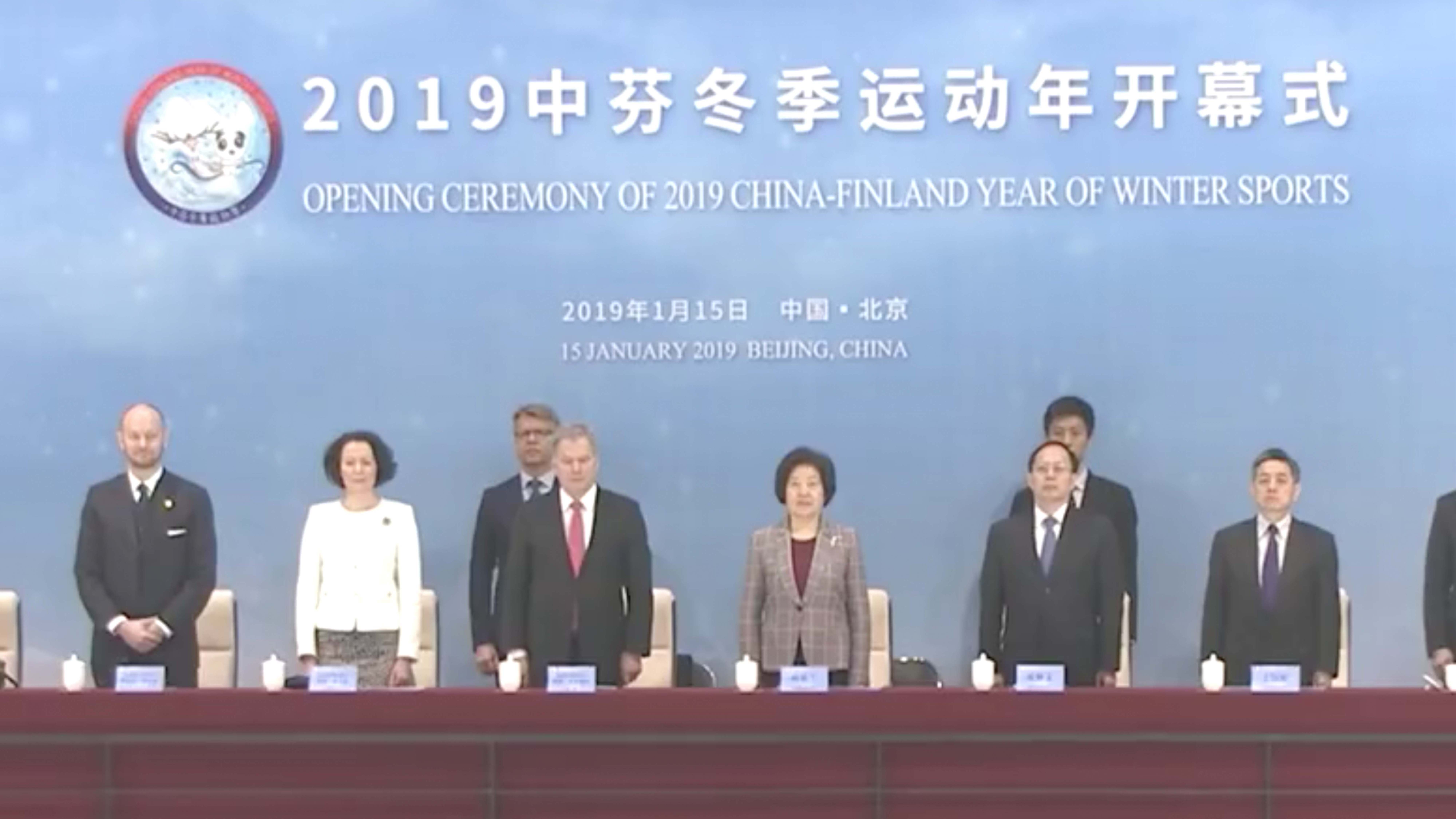
China's commitment to the Winter Olympics is in a class of its own.
According to a recent ski industry white paper, despite economic slowdown and a shaky foundation, 21.3 million Chinese found their way onto the ski slopes in 2018, a 14.4-percent increase from the previous year, thanks in no small part to the ski courses set up by schools for budding enthusiasts. The number of artificial ski resorts in China also surged from 21 to 26, while the country added 76 new ski simulators, recording a stunning 110 percent growth year-on-year.
Looking back now at China's lofty goal in 2015 to get 300 million people involved in winter sports and create an industry worth over 160 billion yuan (approximately 24 billion U.S. dollars) by 2025, it is not as far-fetched as it seemed.
Such has been China's determination to turn itself from a fringe player in winter sports to a respectable behemoth. It is an earnest fixation, trickled from the top down through the government, schools, and individuals.
Perfect pair
For all the enchanting backstory, doubts still linger. China does have the wherewithal, momentum, and goodwill, but there is no easy fix to the yawning gap the Chinese still have to make up with other winter sports superpowers.
How readily such gulf in class is bridged could have a direct bearing on whether China will secure a role on the world stage of winter sports that commensurate with the country's tremendous economic clout.
"China is an enormous country with enormous possibilities. It has equally big ambitions, aspirations, and demands for various kinds of products, services, and expertise. The know-how Finland can provide to China is top notch, be it athletes and coaches development, sports equipment production, major sports events organization or grass-roots physical education. And we are willing to share our rich experience," Kati explained to CGTN.
"In fact, the cooperation between our two countries has already begun to thrive, especially when it comes to coaching and training. Right now, over 100 Chinese cross-country skiers are training in the Vuokatti Sport Olympic Training Centre, and over the next few years Chinese ski jumpers will continue to receive first-class instructions in Kuopio."
"In addition, a number of Finnish instructors have traveled to China to teach cross-country skiing, snowboarding and ice hockey."

Finland's Lahti Sports Centre boasts state-of-the-art ski jumping facilities. /CGTN Photo
Finland's Lahti Sports Centre boasts state-of-the-art ski jumping facilities. /CGTN Photo
Another issue worth noting is that Finland will also play an essential role in helping China promote winter sports among disabled people.
"We will work together to enhance disabled people's access to winter sports. And this initiative is in perfect harmony with preparing for the upcoming Beijing Paralympics," Kati said.
"I believe that this approach of access for all, equal opportunity and social well-being are key factors leading to Finland being declared the happiest nation in the world," she added.
Being a latecomer to winter sports, China faces immense obstacles to overcome, not least because money cannot buy overnight the proficiency and cultural identity needed to emerge as world beaters. But Kati, a former athlete herself, remains sanguine about China's future prospects.
"The advent of new technology and multi-purpose arenas and facilities have provided new opportunities to develop winter sports, especially for beginners like China," she observed.
"Finland has great expertness in this area of building modern sports infrastructure and platforms for playing, training and exploring by using the most technologically innovative, energy efficient and environmentally friendly solutions."
"In the build-up to Beijing 2022, there is a wide scope for cooperation between our two countries."

The Chinese national ice hockey team flag is hanged at the Sport Institute of Finland in Vierumaki. /CGTN Photo
The Chinese national ice hockey team flag is hanged at the Sport Institute of Finland in Vierumaki. /CGTN Photo
Petri Tulensalo, director of Business Finland Winter Sports Management Center concurred, stressing that a special program has already been earmarked for deepening the China-Finland collaboration.
"We set up Finnish Winter Sports Cluster to support the development of winter sports in China by evaluating potential business partnerships with our expertise and insight. Currently, we have brought together about 60 companies that cover a wide range of fields including ice, snow, and education," Tulensalo revealed to CGTN.
He then regaled us with a glowing account of his last visit to China. "We went to Nanjing and Xi'an and this is our first trip to these two cities. We had excellent discussions during our stay there and saw great opportunities to work collaboratively with Chinese to build multi-purpose arenas and expand indoor winter activities."
"The Cluster has signed several memorandums of understandings (MoUs) and agreements with Chinese organizations and companies and we're looking forward to strengthening our cooperation in the future."
Shackle free
Notwithstanding the nationwide drive to narrow the gap, the jury is still out on whether China could replicate the success Finland has had in Winter Olympics. Yet Kati pointed out the single-minded pursuit of victory on the ice risks missing the point.

A peek into the Sport Institute of Finland's impressive Wall of Honor. /CGTN Photo
A peek into the Sport Institute of Finland's impressive Wall of Honor. /CGTN Photo
"I think the most important aspect of our cooperation is to foster a real, long-lasting winter sports culture in China and early childhood education is vital to planting the seeds of sports.
"In Finland, children are introduced to winter sports at a very young age and they become familiar with them as early as in elementary school.
“Finland has always been a sport loving country. Sports, especially winter sports, are deeply embedded in our DNA. We certainly have a lot to offer in this respect."
It is a sentiment echoed by Ismo Hamalainen, training center director at the Sport Institute of Finland in Vierumaki, the country's Olympic training facility.
"Right here, all the sports facilities and infrastructure are within walking distance of school dormitories. Students are encouraged to take the initiative to decide what kind of sport they most like to play, find answers within the sport they choose and explore their strengths in a relaxed environment."
"Meanwhile, our coaches frequently receive high levels of training from various educational programs and they in turn help create a nurturing environment where the kids flourish."
"I know China has begun to invest in the development of school physical education and mass sport instead of purely focusing on high-performance sport. It is a step in the right direction," Kati chipped in.
"I am sure in the near future, China will be a strong winter sports country on the international stage and it will thrive in winter sports in 2022 and beyond."
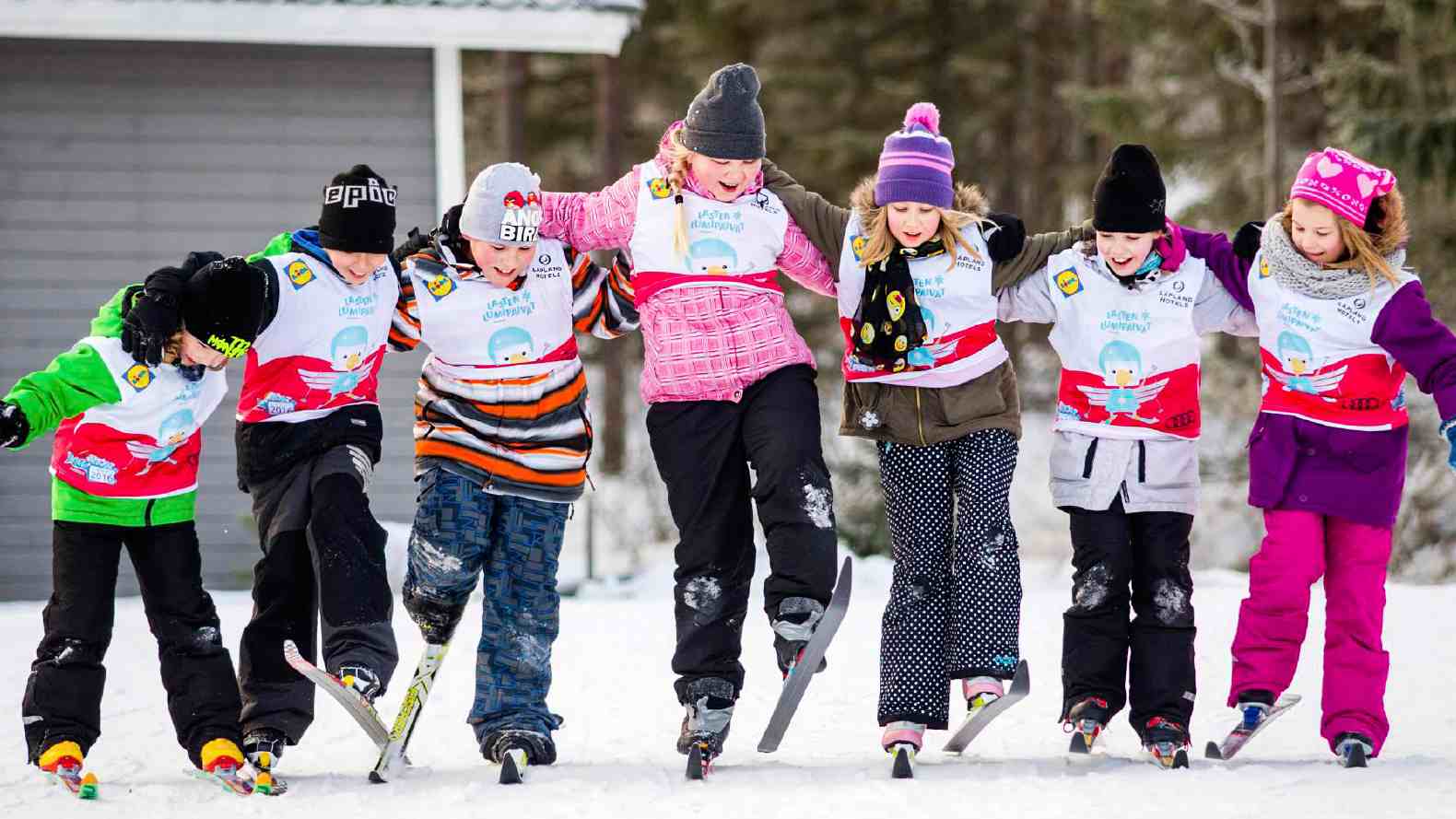
As the saying goes 'Finnish people are born with skis on their feet'. /CGTN Photo
As the saying goes 'Finnish people are born with skis on their feet'. /CGTN Photo
This is, of course, an unfinished story, with so many intoxicating collaboration projects, key pledges and even potential pitfalls on the horizon. No one knows what to expect from China in 2022. A lot could happen between now and then.
The intrigue here is not just the results, the medal standings, or the polarity between the gargantuan late bloomer and the nation at the other end of that scale, but the distinctive trait in Finland's awe-inspiring miracle, a romance of resilience, stamina, tenacity, and guts, or as the Finns call it "Sisu."

SITEMAP
Copyright © 2018 CGTN. Beijing ICP prepared NO.16065310-3
Copyright © 2018 CGTN. Beijing ICP prepared NO.16065310-3